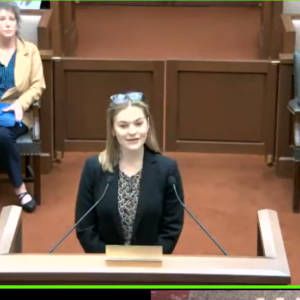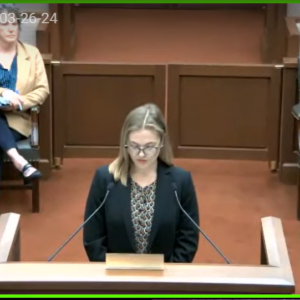Immigrants’ Rights Clinic Student Represents Client Before the Nevada Pardons Board
Madison Villarreal, ’24, reflects on her experience preparing for and representing a detained client before the Nevada Pardons Board.
Preparation
As an advanced student with the Immigrants’ Rights Clinic, I had the opportunity to represent a detained client before the Nevada Pardons Board to request a pardon of our client’s prior criminal convictions. While a pardon of his criminal convictions would not have a direct impact on his immigration case, it would allow for potential new and additional avenues for him to remain lawfully in the United States. When I first started preparing my client’s pardon application in the fall, I never expected that I would be presenting before the Pardons Board in Nevada only a few months later. There were several obstacles that we had to overcome in order for my client, P, to even qualify for a pardon, and the more I researched, the clearer it became that being granted a pardon would be a long shot. To say I was shocked when I found out that he was on the Pardons Board agenda just a few months later would be an understatement. I always thought P was an excellent candidate for a pardon because he really has fully changed his perspective on life since being detained and has accomplished so much despite the circumstances. He is incredibly impressive, but I thought the timing hurdles would hold him back, and I am very happy that I was wrong.
I am so grateful to the Nevada Federal Public Defender’s (NFPD) office who helped us prepare for the Pardons Board Hearing by answering our questions and mooting my statement. They also helped me practice answering questions the Board members may raise. The moot with the NFPD office was also very helpful because they identified key issues that we had not considered fully and they pushed us to be more transparent in discussing the impact a pardon would have in P’s immigration case.
I am also very grateful to my supervisor, Lisa, who helped me immensely in my preparation by working through several iterations of my statement and teaching me how a pardon would impact P’s case. I was definitely intimidated by the idea of presenting before the Pardons Board at first because I felt there was so much I didn’t know about P’s case and I find that I am someone who always likes to be fully up to speed on something before speaking in front of others, but Lisa ensured that I knew everything I possibly had to know. We did a mini moot in the hotel lobby the night before the appearance, and I felt much more confident about my abilities afterward. The hard work paid off because our client was granted the pardon.

Pardon Hearing
There were a few surprises throughout the pardon hearing itself. First, we expected that most of the members would be present at the Nevada Supreme Court in Carson City, where Lisa and I were physically located, but five of the nine members of the Board appeared via Zoom from the Las Vegas Supreme Court location. It didn’t change our presentation at all, but it was unexpected. Second, the Board members that appeared took a completely different perspective on the case than we had anticipated. My statement and answers to the Board’s questions were premised on the idea that the Board would not want to weigh in on a decision that they believed was an immigration decision. To that end, we focused on comments that would allow the Board to understand that they were not overstepping lines or making immigration decisions by granting him a pardon. Instead, our goal was to focus on the criminal conviction and the positive changes P had made in his life. To our surprise, some of the Board members and the District Attorney did want to understand more about the immigration implications. Luckily, we prepared for the exact questions the Board members asked me, so the question portion of the meeting was not a surprise, and I felt well-prepared.
Unfortunately, because P is in immigration detention, he was not allowed to be present physically for the hearing. I wish I could have been with him in person to hear him speak and celebrate the win together. The assistance from the Executive Secretary at the Nevada Pardons Board proved crucial, for it was her diligent efforts to connect ICE with the technology team of the Nevada Supreme Court that allowed for P to participate in the hearing, even if it was only over the phone.

Overall, I feel so lucky to have had the opportunity to work on a pardon from the beginning application stages to the final hearing, and for such an incredible, inspiring, and kind person. P is so overwhelmingly deserving, and I was so happy to hear his excitement when we spoke with him over the phone after the hearing. While it may not guarantee his freedom, at least it provides him with a little hope and positivity in his life. I am proud of myself for working so hard to review all the materials and listen to previous hearings because I think all my preparation paid off and made me feel so much calmer and more confident on the day of the hearing. To be clear, I was still incredibly nervous, but as soon as I got up there and started speaking, I felt the nerves melt away and become replaced with motivation to do the best I could for P. I still cannot believe he received the full, unconditional pardon, and I will always cherish the memory of the Executive Secretary stating, “The motion has passed.”
